Tag: Self-Confidence
Do You Own It? Or Does It Own You?


Photo by Marcus iStrfry on Unsplash
When I look at my life, I see a cliché: a rollercoaster — a few flat moments, and lots of ups and downs. For the most part, it’s been fun. But sometimes it overwhelms me, especially when things don’t roll as expected. Eventually, I realize I better get a grip.
—
What is the point of riding a rollercoaster, if you’re not going to own the experience?
—
As a coach, my job is to help people get unstuck, and that starts by them owning the experience they’re going through. As long as the experience owns us, we’re stuck and we can’t move forward.
—
Owning the experience means recognizing realistically what is happening — no more, no less — and then accepting it just as it is.
—
Only then can we figure out what to do next. Here is what I do to help myself and others own the experience.
First, frame the experience in a more constructive, less apocalyptic light. What is fact, and what is interpretation? What else could this mean? What is useful here? How could this help us grow?
Second, share the experience transparently with others. When we overcome the vulnerability of openly sharing our struggle, we dispel the power the experience has over us. As Mr. Rogers* would say, if it’s mentionable, it’s manageable.
—
Worse than the experience of feeling overwhelmed, is the experience of not owning this experience.
——
*Mr. Rogers was a TV host, author, and producer; best known for the preschool TV series “Mister Rogers’ Neighborhood”.
The Meaning of Failure
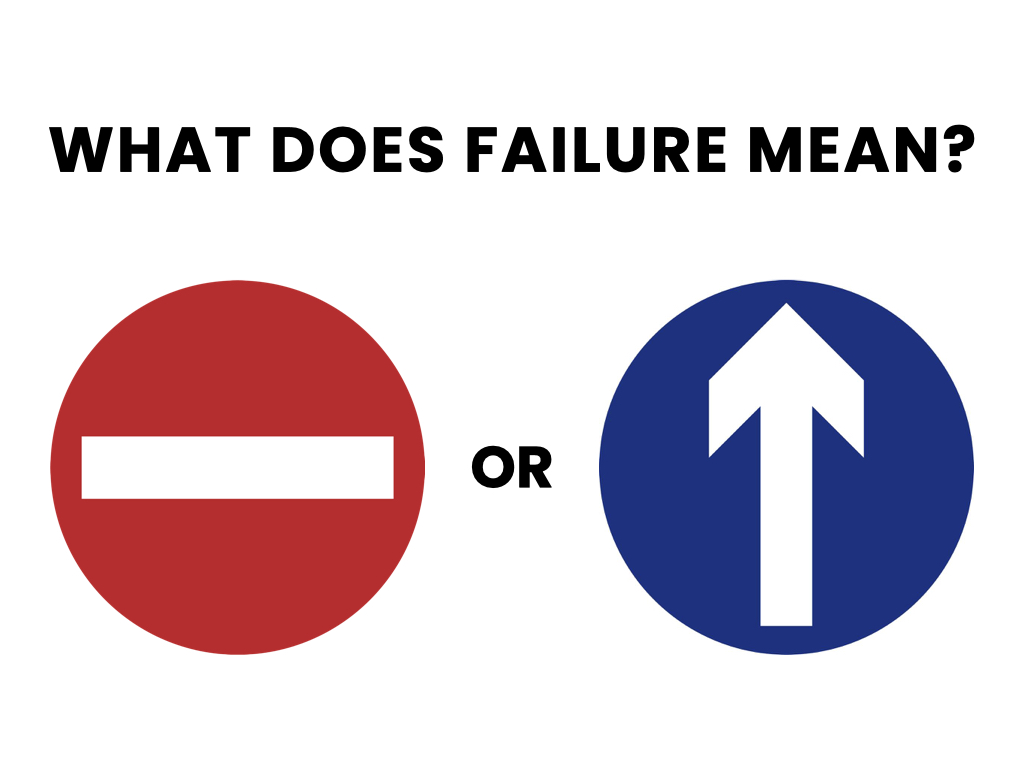
When I was 12, my sister Fatima and I sang a psalm at a wedding. She sang the verses, and all I had to do was sing along in the chorus. Simple enough, but I bombed it. Totally out of key. That day, I learnt I couldn’t sing.
A few years later, I learnt to play guitar and joined the youth choir in church. Truth be told, I was more interested in hanging out with my friends and being around girls than singing. After all, I couldn’t sing.
Then I had music classes in the seminary. But I struggled a lot. When I sang in the choir, the conductor, my friend Marco Luciano, would glare at me from time to time. That was code for: Shut up! Just move your lips and pretend you’re singing. No surprise here, after all I couldn’t sing.
While still in the seminary, I played guitar and double bass in two bands. We weren’t famous, but enough to go on tour in the summer. I composed songs for those bands. But I never sang. After all…

Lately, I’ve been enjoying some quality time with my guitar. When my daughter is not around, there’s no one to sing. So I have to sing. At 45, I realised I can learn to sing. I’m no Pavarotti, but I was capable of singing in a recent talk I gave. And my neighbours haven’t complained… yet.
There were many signs indicating that I could probably learn to sing: the choirs, the instruments, the bands, the composing. But I didn’t learn because I thought I couldn’t, plus there was always someone else to do the singing.
Failure means we don’t know something. It doesn’t mean we are incapable of learning it. When we fail it might be a good idea to create ways to force us to learn, at least just a bit.
—
Failure is an “ahead only” sign — you must keep going at least until the next intersection.
—
As teammates, friends, lovers, parents what sign do we hold up when someone fails?
Wisdom for Teams #11


—
“I’ve always been the opposite of a paranoid. I operate as if everyone is part of a plot to enhance my well-being.”
—
STAN DALE (1929-2007), radio broadcaster, writer, teacher, and founder of the Human Awareness Institute.
The Question That Helped Me Face Uncertainty
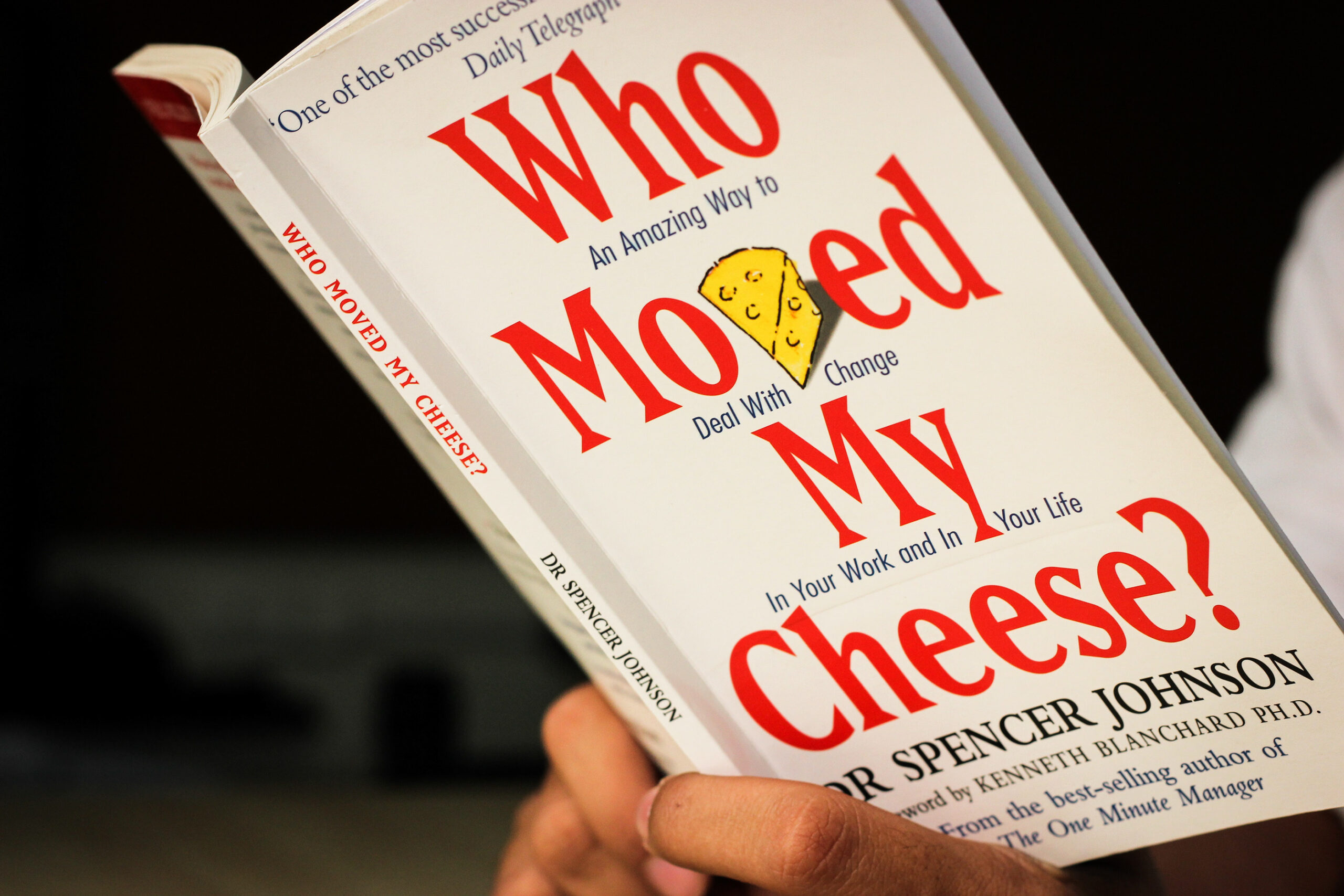

—
Most of my work is done face-to-face. Or at least it used to be. When the pandemic broke out I soon realised that a profound and irreversible change in the events and training industry was going to take place. The urge to freak out was big:
- How long will the confinement last?
- How long until face-to-face events will be allowed?
- How will I transfer my trainings online?
- What equipment do I need?
- How does this sh*t work???!!!
And then it happened. Early on in the lockdown, a friend of mine, Onu Igbokwe, referenced a book: Who Moved My Cheese, by Spencer Johnson. I had read the book years back but decided to listen to the audiobook. Life changing. It’s a must read. If you’ve already read it, and you’re facing uncertainty, then read again.
It’s a short book. A couple of hours is enough. But don’t be fooled by its length. The author says it took about 20 years to write it. Every word counts. What most changed my approach and behaviour was one simple question:
—
What would I do if I were not afraid?
—
The voice in your head might be saying: “But I am not afraid”. So here are other reactions to the uncertainty that comes with change:
- worry, concern, unease
- doubt, self-doubt, confusion, hesitation
- agitation, stress, anxiety, nervousness
- denial, refusal, complaining, intolerance, aversion
Fear has a funny way of disguising itself. If you’re feeling any of these, chances are there’s a degree of fear involved — the fear of failure. So here’s another way of putting the question:
—
What would you do if you could not fail?
—
After listening to the book things got better. I did a full-blown online training with Amazon, and was invited to impart shorter trainings and talks, as well as online coaching sessions. And next week I’ll be facilitating a two-day online “home-site” with King, the creators of Candy Crush.
Luck? Yes. Absolutely. So much luck. I also like to think Seneca is at least somewhat right when he says luck is what happens when preparation meets opportunity.
But even if the book or my behaviour had nothing to do with my work picking up, my experience nonetheless of these uncertain times has consequently been more tranquil. So thank you, Spencer, and thank you, Onu!
How to Leave A First Good Impression

Darrell is a polite, handsome man, who had little luck meeting people and making friends. He didn’t get why and it was frustrating. I first met Darrell during his final months in prison — a few of robberies and a bad temper had got him into trouble.
But Darrell is one of the few who manage to overcome the nasty effects of jail time. He decided to change. And he did. What didn’t change was the way people reacted to him. It seemed as though everyone knew his past. Then he figured out why.
And it had nothing to do with his past.
.
People won’t figure out your past by looking at you.
But they’ll read your present in just a glance.
People won’t figure out your past by looking at you.But they’ll read your present in just a glance.It was actually quite obvious and he felt stupid for not figuring it out earlier. Back in the day, Darrell had the side of his neck tattooed with the universal “F*** YOU”. It was small but nonetheless LOUD!
He had it for so long, he no longer noticed it — Gosh, I no longer noticed it and I hadn’t known him for that long. But for people who didn’t know him it was a big thing. Obviously! It automatically kept everyone away, giving him no chance to interact.
So Darrell covered it with a new tattoo. And the next time we met… he was smiling.
Don’t be surprised at the way people react to you
when your face is telling them just how you feel.
We might not have tattoos on our neck, but our facial expression and body language are tattoos we carry around always. They provide universal information before we speak. The way you look, move and talk are the first signals other people pick up.
In the art of human relations, this is nothing new. However, we’re not always aware of how we read these signs automatically (and sometimes unconsciously) and how others do too.
There’s never a second chance to leave a first good impression.
Do you sometimes feel a bit concerned about leaving the right impression or little uneasy when meeting people for the first time? I do. But think about it: other people do too. Chances are they’re busy thinking about themselves, not about you!
So before I step in, I make a conscious decision to step away from this trap, and think: These are people, not monsters. And they’re in the same situation as me.
If you’d like people to walk away thinking: “Well, that was pleasant. Seems like a nice person. What conviction!” here’s a tip:
Your best business card is YOU. Make sure you look the way you want others to see you. Stand tall. Radiate determination and serenity with every step. Smile. Make eye contact. Smile. Speak with a clear, confident voice. Smile.
Love to hear what you do to leave a lasting first good impression?
The Connection Matrix – Part One
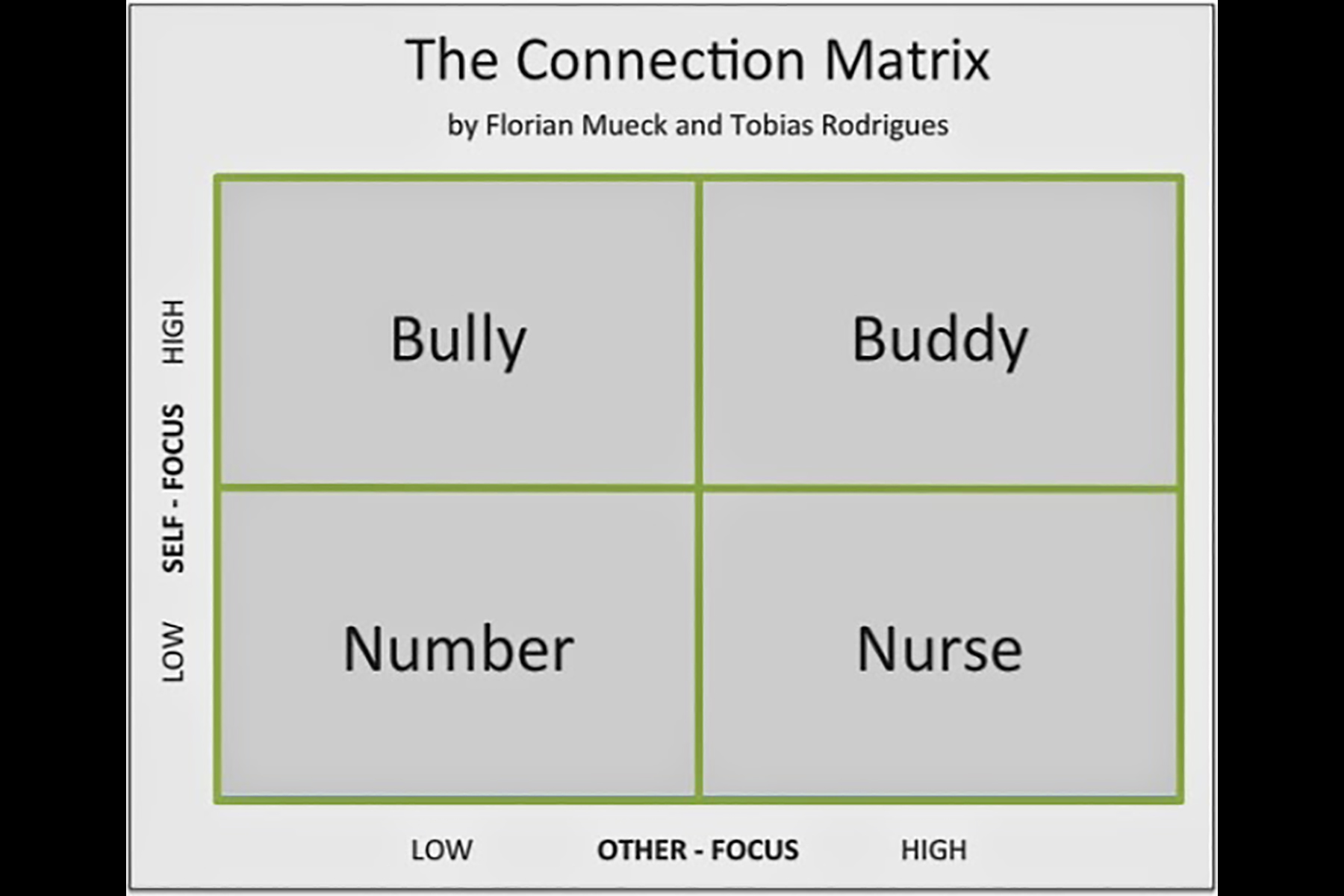
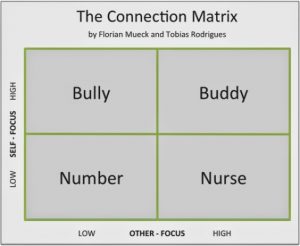
The other day I was sitting on a plane from Warsaw to Barcelona. With me, my friend, speaker and trainer Florian Mueck. We were coming back from a spectacular Spectacular Speaking event.
In her opening speech, the incomparable Olivia Schofield, founder of the Spectacular Speaking series, said: The one thing that takes you from great to spectacular is… connection. Connection. Connection between the speaker and the audience. Connection between oneself and the other.
Florian and I started to philosophize about this subject. We played around with different dimensions and combinations and patterns. We scribbled and painted and drew and scribbled…
In the end, we knew that we wanted to show two dimensions – the self-focus (or speaker focus) and the other-focus (or audience focus). Self/other-focus refers to the degree with which one chooses to be concerned with oneself and with others.
We also knew that we wanted to use the high-low categories. Our big challenge – the four field titles. After three hours we finally felt confident about the names. “The Connection Matrix” was born.
The Connection Matrix shows four different kinds of speakers/communicators. In this first part we’ll look at the status quo of their communication mode.
Number – Low Other/Low Self
Low empathy combined with low self-interest. Numbers drive through life with their handbrake on. They’re the typical business presenters. Not passionate about the data they present, numbers deliver only to deliver. Their voice? Monotonous. Their body language? Closed. Their enthusiasm? Not existent.
They say: But how can I put passion into my monthly business unit report? Numbers never consider a speech or presentation an opportunity. For them, communication is an obligation. Creativity is for artists, they think.
They also think: I do my job. Isn’t that enough? If others don’t like what I say, it’s not my fault. Numbers are brilliant at avoiding responsibility – for themselves and the audience. Like Florian’s mom says: Where there’s no hook, you cannot hang a jacket.
The paradox with numbers is that they don’t count: no one listens, no one remembers, no one cares. Connecting as number, you fail to connect. Number-mode is beneficial only when you wish not to connect. Numbers are the poorest connectors of the four types.
Nurse – High Other/Low Self
High empathy combined with low self-interest. Nurses strive to please their audience. They communicate with the language of “you” and their goal is to promote the audience. A nurse’s communication style consists of satisfying the interests of others.
The paradox with nurses is that by failing to affirm their self-interests, the connection entails no expense and so is undervalued. Because nurses don’t speak up for themselves, audiences don’t really listen, care less and very easily forget.
Connecting as a nurse, you don’t make an impact. Nurse-mode is beneficial when you wish to go unnoticed. If you don’t shift to buddy, your audience will soon take you for granted!
Bully – Low Other/High Self
Low empathy combined with high self-interest. Bullies strive to satisfy their own interests. Bullies communicate with the language of “I” and their style consists of pushing an agenda.
In bully-mode, you believe only you hold the power to make a change. So you feel you have little to learn from your audience. A bully’s preferred strategy is Follow me, now!
The paradox with bullies is that in failing to give the recognition they seek, they struggle all the more to get it from their audience. People listen, they remember, oh! but they don’t care.
Connecting as a bully, you fail to inspire trust. Bully-mode is beneficial when all you want is to stand out from the crowd. If you don’t shift to buddy, your audience will begin to feel betrayed and soon you’ll end up talking to yourself!
Buddy – High Other/High Self
High empathy combined with high self-interest. Buddies strive to develop a whole that is greater than the sum of its parts. Buddies communicate with the language of “we” and their style consists of promoting ways to satisfy self-interests and the interests of others.
In buddy-mode, you believe in a joint potential and so the purpose of communicating is mutual growth. The preferred strategy is How shall we do this? You know you’re listening to a buddy when you’re pushed out of your comfort zone and it feels good!
The paradox with buddy-mode is that when you place the connection at the center, the result is the speaker meets her goals and the audience gets what they came for. Everyone is happy. Audiences remember buddies, they listen to them, and they definitely care.
Connecting as a buddy, you act like a magnet, attracting others to move out their communication mode and to connect as buddies. Buddy is the ultimate mode of connection because everyone grows beyond expectation.
Whether you consider yourself a Number, a Nurse or a Bully, in The Connection Matrix – Part Two we’ll share with you insights on how to become a Buddy, the ultimate connector.
The Impact Of Unconventional
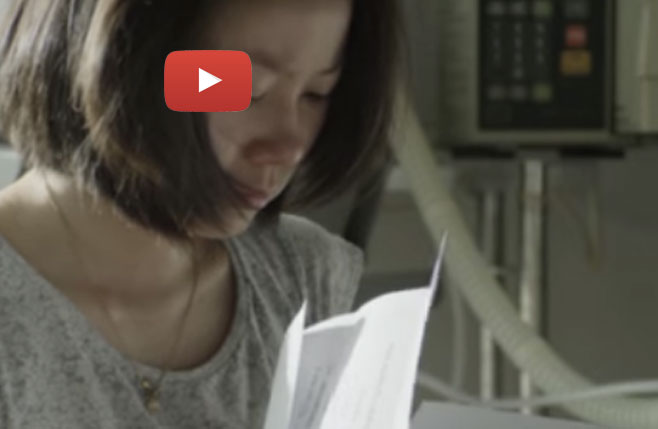
The video above got me thinking about the impact of unconventional gestures of generosity on our lives. If you haven’t seen it, please do so – it’s more important than what you’ll read here.
If traumatic events can stick with us forever, acts of generosity fuel our motivation for a lifetime, especially if they’re unconventional and do not conform to typical conduct.
In the video, no one expects a thief – especially a youngster – to be “rewarded”. What strikes me is not that it‘s extreme, but that it doesn’t follow the usual expected behavior.
The effects of unusual kindness go far beyond feelings of gratitude.
Unconventional generosity is a credible way of saying two vital things: I believe in you, and you are worthy of appreciation. There’s nothing more important to say in life than this.
When it comes to self-confidence and self-acceptance, words only go a certain distance. Sometimes, saying “I believe in you” and “You’re outstanding” isn’t enough. Sometimes, you need to show you believe and appreciate.
Much more than words, actions are credible – you can see them, recall them, hang on to them. They’re the fuel of our motivation.
Being unconventionally good makes a difference.
This also applies to our professional network. Things like putting yourself on the line for someone you don’t really know, giving a compliment just because, stopping to notice when no one else does or giving the new guy a place of honor make a huge difference.
Maybe you won’t see the effects of the good you’ve done. Maybe you won’t get the credit you deserve. Maybe you won’t reap the fruits thirty years later. Maybe.
But people like the man in the video just won’t let you forget that being good is not about good rewards. It’s about better people!
Know that all unconventional generosity has an impressive impact. Trust that it reaches beyond the sense of gratitude out on to the sacred fields of self-confidence and recognition. Follow on. Follow on.
Be unconventionally good! It works.
Words That Empower You

I’ll never forget the first time I was called on in class after moving to Portugal. It was the ninth grade geography class. I studied hard. But, having recently moved from Canada, my teenage mind was still in French mode: I read in Portuguese, but my brain worked in French.
So after clearing my throat to talk, nothing intelligible came out. A huge laugh from everyone was the result, including the teacher! That day I understood (the hard way) that words play a big role in communication.
Similarly, language has a powerful influence on relationships. The words we use to express ourselves – and before that the words we use to think of ourselves and others – shape the way we feel when we relate to others.
When we feel empowered – calm, clear and confident – we relate to others in a rewarding and dynamic manner. When we don’t, relationships are unproductive and toxic. Words play a major role in this.
Here are 2 ways to use language to empower relationships:
- When facing a challenge, use sentences where “I” is the subject instead of “you”. I’m not saying we talk about ourselves all the time. I mean that when we describe our reality with “I” sentences, the power to influence and change that reality increases greatly.
“You” sentences tie your hands. You depend on others.
Imagine your coworker Emilia has the ball, the ball being anything you want. Consider the sentence: “Emilia has the ball and won’t give it to me.” Here, Emilia has all the power because she’s the subject: She has the ball; she won’t give it to you.
“I” sentences give you agency,
the power to shape your reality and relationships.
Now consider this: “Emilia has the ball and I haven’t found a way yet for her to give it to me.” Here, power is balanced: She has the ball but you haven’t yet found a way to get it. Now there’s something you can do (find a way), which means you have power. Subtle but very effective.
- In difficult situations, use the verb “to do” not “to be”:“to be” is disempowering because it focuses on the person; “to do” is empowering because it focuses on the event.
For instance, you turn to Emilia and say: “You are uncooperative”. This suggests a negative feature about her, which might provoke a defensive reaction on her part.
Instead “you did something uncooperative” might avoid that because it describes an action, not her. Moreover, “to be” suggests more permanent traits; while “to do” leaves room for things to change.
The language of “I” and “to do” is empowering.
It enables us to feel calmer, clearer and more confident.
Sometimes the influence of language is not evident and can be tricky to use. Leave a comment with what is on your mind. You can also send me an email to t@tobiasrodrigues.com. Looking forward to hearing from you.
By the way, there was someone in my geography class who actually thought my attempt was kind of cute: the pretty sister of one the real popular guys in school. It was my first “Portuguese” crush.
Your Body Spoke

Last week I had the pleasure of listening to a great speech entitled “Your Body Speaks” given by my good friend Evgueni Talal at our Prestigious Speakers Toastmasters club meeting.
I normally thought of body language as that part of communication that our bodies convey to others and that other people’s bodies convey to me. But that evening Evgueni gave it a twist and got us thinking in a different way: Your body speaks to you. Are you listening?
I will usually listen to what other people’s bodies are saying. And I make an effort of being aware of what my body is telling them. But I really hadn’t given much thought to the idea that my body is also talking to me, that I can listen to it.
Don’t get me wrong, I do pay attention to my body: when hungry, I eat; when tired, I rest; when restless, I exercise… But I hadn’t thought about this relation as a conversation.
Have you spoken to your body?
What is it saying?
Conversations (real ones at least) involve memory, interaction (action + reaction + action + …), openness, reflection and unpredictability. Conversations allow for disagreement and conflicting views, and thus for persuasion, compromise and collaboration.
Wow! I hadn’t realized I could do all that with my body! Have you ever pictured your relationship with your body in these terms?
Social psychologist Amy Cuddy gave a fantastic talk on TED TALKS (click to watch). She postulates and proves that our bodies work for us. Our body postures change our brain chemistry as well as the way others perceive us.
Our bodies boost our self-confidence. They are powerful allies and agents of our happiness. It goes beyond food and exercise – It’s a creative conversation!

